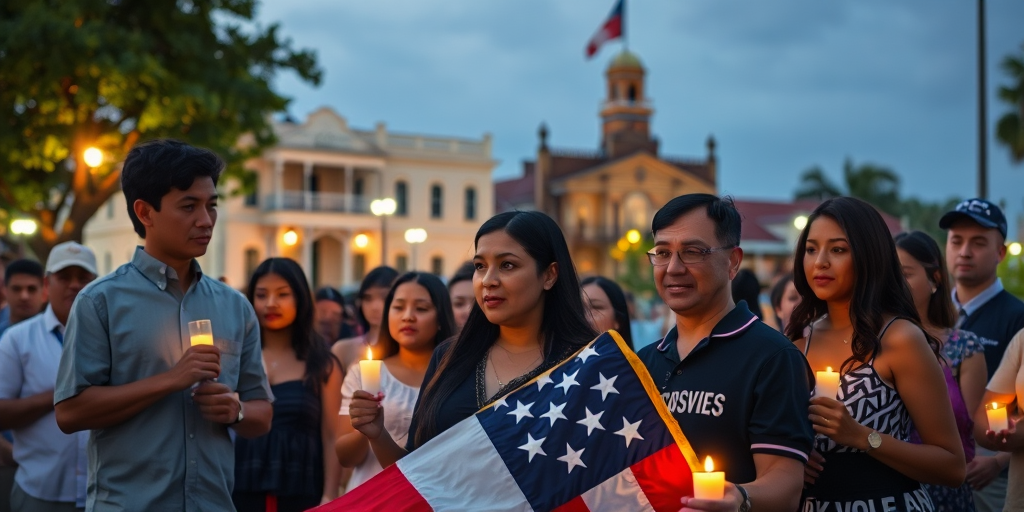Fallen Brownsville Sailor Laid to Rest: A Community’s Call for Justice and Safety
In a solemn ceremony filled with military honors, the late Brownsville native and sailor, Angelina Resendiz, was laid to rest on a poignant Friday, June 27, 2025. Her untimely death has sent ripples of grief, concern, and a demand for accountability across the Rio Grande Valley community and beyond, raising questions about the safety and protection of women in military service.
A Grieving Community Seeking Answers
The discovery of Resendiz’s body in a wooded area near a naval station in Norfolk, Virginia, earlier this month shocked her family and the Valley residents who knew her. The seaman, who went missing two weeks prior, was found dead under circumstances that remain under investigation by the Naval Criminal Investigative Service (NCIS). The unresolved details of her case have fueled discussions and highlighted systemic issues regarding the safety of service members, particularly women.
Resendiz’s mother, Esmeralda Castle, spoke during a candlelight vigil held in her daughter’s honor. Addressing the assembled crowd, Castle shared, “It was beautiful, but I never imagined having a funeral for my child. Angelina was a leader loved by many, and she deserved better protection than what was offered.” Her words were a plea for a deeper probe into the protections offered to female service members.
A Call for Systemic Change
The vigil, attended by dozens of family members, friends, and supporters, underscored a broader demand for change within the military. Naomi Oliva Rios, a veteran who spoke at the event, voiced the frustrations many feel, saying, “The system is broken. Women assaulted or harmed in the military don’t always see justice. We’ve been promised safety, and it’s clear more needs to be done.”
The ceremonial aspects of Resendiz’s funeral were steeped in tradition, featuring a 21-gun salute and the playing of taps, followed by the ceremonial folding of the American flag, which was presented to Castle amidst her grief. The flag’s presentation was a testament to a life of service whose early ending screams for justice and introspection.
Local Impact: A Heartfelt Demand for Change
In South Texas, and particularly within the Rio Grande Valley, this tragedy has resonated deeply. Valley residents are no strangers to the unique challenges faced by military families—many of whom send their children off for service with the hope of not only contributing to national security but also of returning with enhanced opportunities.
This case has notably amplified discussions surrounding the local community’s trust in military and governmental systems. The circumspect handling of Resendiz’s case has been a focal point for advocates who push for greater transparency and reforms in how military investigations are conducted—especially those involving potential foul play or negligence.
In recent years, South Texas has seen growing awareness around various forms of violence and injustice affecting women, mirrored in community initiatives and local policymaking efforts. It emphasizes a grassroots level engagement, seeking to bridge gaps in existing systems, ensure accountability, and fortify protective measures for residents, whether civilian or enlisted.
Looking Forward: Evaluating Future Implications
As the investigation into Resendiz’s death continues, community leaders and activists are increasingly calling for policies that will secure the well-being of service members. The NCIS has confirmed that someone remains in pretrial detention, although charges have yet to be filed formally. If and when charges are made, they promise timely transparency and follow-up.
Various Valley organizations are proposing roundtable discussions to confront these military issues head-on, bridging concerned civilians, military personnel, and elected officials. One initiative includes seeking policies that specifically address the unique vulnerabilities of women in the armed forces.
For Brownsville and the wider Rio Grande Valley, the implications of Resendiz’s case and its potential influence on policy are profound. The hope is for increased momentum in driving not only dialogue but also actionable change.
Resources and Support for the Valley Community
Families and individuals affected by similar issues have access to a range of local resources. The Department of Veteran Affairs’ crisis hotline (1-800-273-8255) offers support to those grappling with grief or mental health challenges. Additionally, local advocacy groups, such as Mujeres Unidas, provide counseling and advocacy services to members of the RGV community affected by violence or military service complications.
As Angelina Resendiz is laid to rest, her story remains emblematic of a wider call for justice and reform. Her passing serves as a crucial reminder to residents of the RGV and beyond: that the safety and dignity of service members are not only a military concern but a community responsibility. The echoes of her life and her family’s demands for justice are setting the stage for potential systemic change—a testament to her legacy in the Valley she called home.







